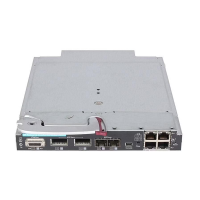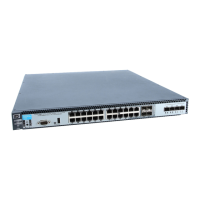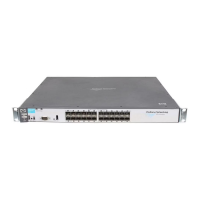Command Remarks
4. Allow the local AS number to
appear in the as-path of
routes from a peer or a peer
group and specify the number
of times that the local AS
number can appear in the
as-path of routes from the peer
or the peer group.
peer { ipv6-group-name |
ipv6-address } allow-as-loop
[ number ]
Optional.
Not allowed by default.
5. Disable IPv6 MBGP from
considering the AS_PATH
during best route selection.
bestroute as-path-neglect
Optional.
Enabled by default.
6. Configure updates to a peer
or a peer group to carry only
the public AS number.
peer { ipv6-group-name |
ipv6-address } public-as-only
Optional.
By default, outbound IPv6 MBGP
updates can carry private AS
numbers.
Tuning and optimizing IPv6 MBGP networks
Configuration prerequisites
Before you tune and optimize an OSPF network, complete the following tasks:
• Enable IPv6.
• Configure basic IPv6 MBGP functions.
Configuring IPv6 MBGP soft reset
After you modify a route selection policy, you must reset IPv6 MBGP connections to make the new one
take effect.
The current IPv6 MBGP implementation supports the route-refresh feature that enables dynamic route
refresh without terminating IPv6 MBGP connections.
If a peer that does not support route refresh exists in the network, you must configure the peer
keep-all-routes command to save all routes from the peer. When the routing policy is changed, the
system will update the IPv6 MBGP routing table and apply the new policy.
Performing soft reset through route refresh
If the peer is enabled with route refresh, when the IPv6 MBGP route selection policy is modified on a
router, the router advertises a route-refresh message to its IPv6 MBGP peers, which resend their routing
information to the router after they receive the message. Therefore, the local router can perform dynamic
route update and apply the new policy without terminating IPv6 MBGP connections.
To configure IPv6 MBGP soft reset through route refresh:
Ste

